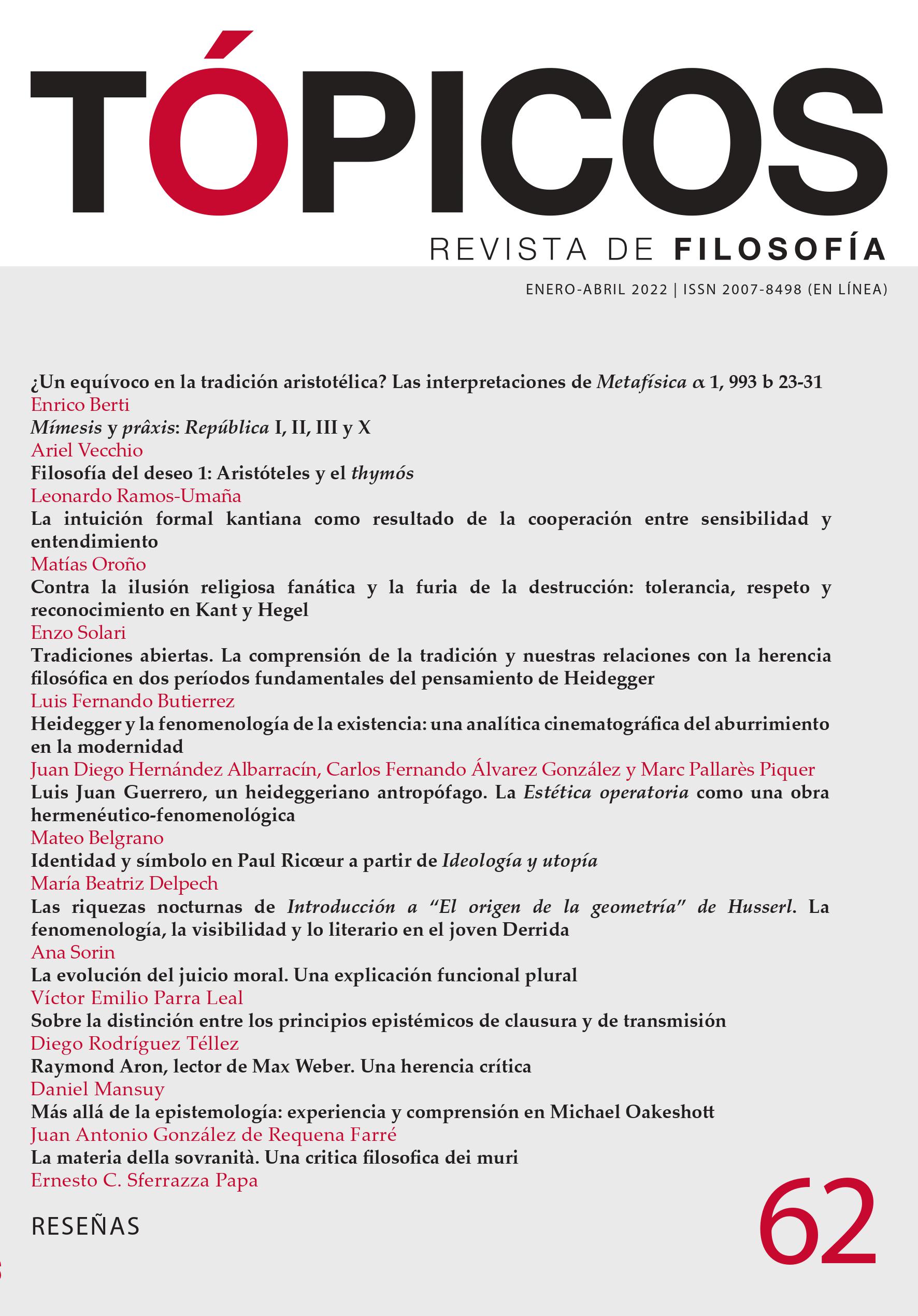Publicado 2021-12-11
Palabras clave
- Alejandro de Afrodisias,
- Metafísica,
- motor inmóvil,
- Dios,
- participación
- perfección,
- verdad,
- creación,
- Aristóteles,
- Averroes,
- Tomás de Aquino ...Más
Derechos de autor 2021 Tópicos, Revista de Filosofía

Esta obra está bajo una licencia internacional Creative Commons Atribución-NoComercial-SinDerivadas 4.0.
Cómo citar
Resumen
En este artículo presento una traducción y análisis de Metafísica α 1, 993 b 23-31 para, posteriormente, mostrar cómo la interpretación de Alejandro de Afrodisias de dicho pasaje condujo a los filósofos medievales a atribuir a Aristóteles una doctrina de la creación. Para Alejandro, las cosas más verdaderas y los seres que son en grado sumo de los que habla Aristóteles en Met. α 1, pasaje que originalmente hablaba sobre la relación entre las premisas y las conclusiones de demostraciones, son los motores inmóviles, que tienen una relación de imitación o participación con las cosas que de ellos dependen. En Averroes, quien prefiere la noción neoplatónica de “perfección”, la causalidad del motor inmóvil se vuelve una causalidad eficiente en sentido fuerte: una explicación no sólo del movimiento del cielo, sino de su ser y el de todas las cosas. Así, hace de Aristóteles un filósofo monoteísta y creacionista implícitamente. Tomás de Aquino, empleando las nociones de “ser por esencia” y “ser por participación” y derivando del “ser siempre verdadero” el simple “ser siempre”, también hace del primer motor inmóvil un creador y funda explícitamente su interpretación en el texto de Aristóteles.
Referencias
- Anónimo. (2003). Liber de causis. Das Buch von den Ursachen. A. Schönfeld (trad). Felix Meiner Verlag.
- Aristóteles. (1961). Protrepticus: An Attempt at Reconstruction. I. Düring (ed.). Acta Universitatis Gothoburgensis.
- Aristóteles. (1963). Metaphysica. W. Jaeger (ed.). Clarendon Press.
- Aristóteles. (1982). Categorías. En Tratados de lógica. (Órganon). I. Categorías. Tópicos. Sobre las refutaciones sofísticas. (pp. 29-77). M. Candel Sanmartín (trad.). Gredos.
- Aristóteles. (1995a). Analíticos posteriores. En Tratados de lógica. (Órganon). II. Sobre la interpretación. Analíticos primeros. Analíticos segundos. (pp. 313-440). M. Candel Sanmartín (trad.). Gredos.
- Aristóteles. (1995b). Metaphysics. En J. Barnes (ed.), The Complete Works of Aristotle. The Revised Oxford Translation. One Volume Digital Edition. (pp. 3343- 3716). W. D. Ross (trad.). Princeton University Press.
- Aristóteles. (2000a). La métaphysique. Dos volúmenes. J. Tricot (trad.). Vrin.
- Aristóteles. (2000b). Metafísica. V. García Yebra (trad.). Gredos.
- Aristóteles. (2006). Métaphysique. Livre alpha. Manuscrito inédito. J. Barnes (trad.). Centre Léon Robin.
- Aristóteles. (2010). Métaphysique. A. Jaulin y M.-P. Duminil (trads.). Groupe Flammarion.
- Aristóteles. (2014a). Metafísica. T. Calvo Martínez (trad.). Gredos.
- Aristóteles. (2014b). Œuvres. Éthiques, Politique, Rhétorique, Poétique, Métaphysique. R. Bodéüs (ed.). C. Rutten y A. Stevens (trads.). Gallimard.
- Averroes. (1966). In Aristotelis librum II (α) Metaphysicorum commentarius. G. Darms (ed.). Paulusverlag.
- Berti, E. (2001). Brentano and Aristotle’s Metaphysics. En R. W. Sharples (ed.), Whose Aristotle? Whose Aristotelianism? (pp. 135-149). Ashgate.
- Berti, E. (2008). Dialectique, physique et métaphysique : Études sur Aristote. Peeters.
- Berti, E. (2009). Nuovi studi aristotelici. IV/1. L’influenza di Aristotele. Antichità, Medioevo e Rinascimento. Morcelliana.
- Berti, E. (2010). Nuovi studi aristotelici, IV/2. L’influenza di Aristotele. Età moderna e contemporanea. Morcelliana.
- Berti, E. (2014). La finalidad del motor inmóvil. En E. Berti, Aristóteles: su tiempo y el nuestro. (pp. 79-98). Tópicos, Revista de Filosofía. Cátedra Tópicos 2014. URL: file:///C:/Users/ebaze/Downloads/Catedra%20Topicos%20Berti%202014.pdf.
- Bonelli, M. (2002). Alessandro di Afrodisia e la metafisica come scienza dimostrativa. Bibliopolis.
- Broadie, S. (1993). Que fait le premier moteur d’Aristote ? (Sur la théologie du livre Lambda de la Métaphysique). Revue philosophique de la France et de l’étranger, 183(2), 375-411.
- De Afrodisias, A. (1891). In Aristotelis Metaphysica commentaria. M. Hayduck (ed.). Colección Commentaria in Aristotelem Graeca. Reimer.
- De Aquino, T. (1986). Super librum de causis. C. D’Ancona (ed.). Rusconi.
- De Aquino, T. (1995). De ente et essentia. P. Porro (ed.). Rusconi.
- De Aquino, T. (2000a). Sententia libri Metaphysicae. En Opera omnia. Recognovit ac instruxit Enrique Alarcón automato electronico Pompaelone ad Universitatis Studiorum Navarrensis. E. Alarcón (ed.). Universidad de Navarra. URL: https://www.corpusthomisticum.org/cmp00.html.
- De Aquino, T. (2000b). Summa Theologiae. En Opera omnia. Recognovit ac instruxit Enrique Alarcón automato electronico Pompaelone ad Universitatis Studiorum Navarrensis. E. Alarcón (ed.). Universidad de Navarra. URL: https://www.corpusthomisticum.org/sth0000.html.
- De Couesnongle, V. (1954a). La causalité du maximum. L’utilisation par Saint Thomas d’un passage d’Aristote. Revue des sciences philosophiques et théologiques, 38(3), 433-444.
- De Couesnongle, V. (1954b). La causalité du maximum: Pourquoi Saint Thomas a-t-il mal cité Aristote ? Revue des sciences philosophiques et théologiques, 38(4), 658-680.
- Liddell, H. G. y Scott, R. (1958). A Greek-English Lexicon. Clarendon Press.
- Teofrasto. (1993). Métaphysique. A. Laks y G. Most (trads.). Les Belles Lettres.





